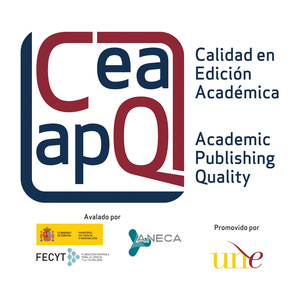The CEA-APQ Seal of Quality in Scholarly Publishing opens its seventh call for entries
-
09/01/2023
ANECA, in collaboration with UNE and FECYT, is in charge of its creation and development.
The deadline for applications begins on 9 January and ends on 17 February.

The Seal of Quality in Academic Publishing (CEA-APQ) opens its seventh call for all those public and private academic publishers who wish to obtain it or renew the one obtained in previous editions.
Currently, 56 collections have this seal, which recognises best practices in Spanish university publishing, promotes and stimulates quality in academic publishing and is an indication of scientific quality recognised by research activity evaluation agencies and the university community.
The creation and development of the CEA-APQ seal is led by ANECA, in collaboration with the Union of Spanish University Publishers (UNE) and the Spanish Foundation for Science and Technology (FECYT).
Applications can be submitted from 9 January to 17 February on the website http://www.selloceaapq.es, where the rules of the call, the evaluation guide and the application manual are already available, as well as the necessary templates for the application process.
The seal, which accredits scientific quality, is awarded to those collections that meet the requirements in four sections:
- Informative quality of the collection. The seal assesses different aspects of the communication, dissemination and accessibility of the collection, as well as the identification of the collection, the inclusion of metadata and reviews in scientific journals.
- Quality of the editorial policy. The requirements, in this case, analyse the definition of the editorial policy of each collection and the identification and prestige of the director of the collection and the scientific committee.
- Quality of editorial processes. Publishers must accredit the existence of detailed instructions for the submission of works, information on the manuscript selection process and the reasoned communication of the acceptance or rejection of works.
- Reputation and prestige of the collection. Finally, the requirements in this section assess the frequent publication of works by people from outside the publishing institution and the capacity to attract original works by foreign authors, in addition to the citations and reviews received.
What's new in the 2023 call
Precisely in this seventh call, the Seal of Quality in Academic Publishing increases the requirement for the percentage of authors from outside the institution of the publishing house from 45% to 50%, whether the publishers are public or private.
At the same time, it obliges to reduce from 30% to 20% that the persons responsible for the collection (directors, editors or coordinators) may be authors in all the titles published by the collections in the evaluated period.
Another new feature of this seventh call is that the seal, which is awarded for a period of 5 years, will recognise the titles published in the period under evaluation, so that the renewal must be submitted in the fifth year of award.
Indications of quality
Since its first call in 2017, the CEA-APQ seal has been recognised as an indication of the quality of publications for the evaluation of the merits of research activity, a recognition that is expressed in the evaluation criteria of the six-year periods of the National Commission for the Evaluation of Research Activity and in the evaluation criteria of ANECA for the accreditation of civil servant teaching staff (ACADEMIA programme).
